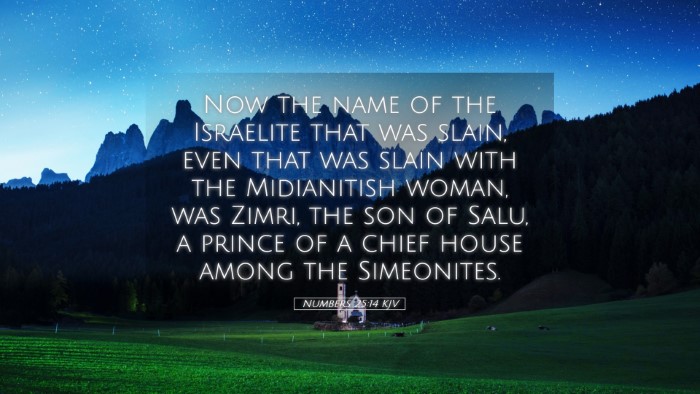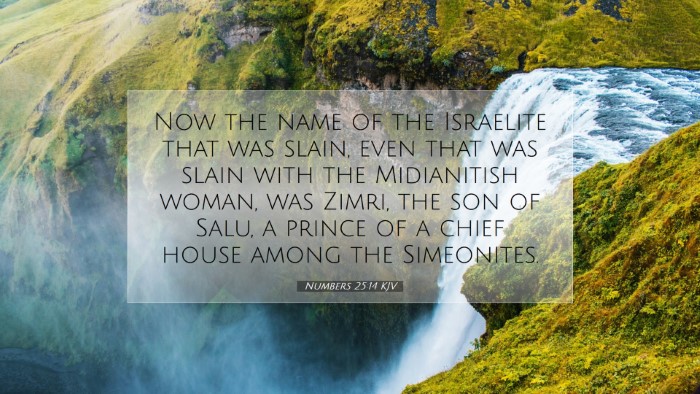Commentary on Numbers 25:14
Introduction
The verse Numbers 25:14 states, “The name of the slain man of Israel who was killed with the Midianite woman was Zimri, the son of Salu, a leader of a father’s house among the Simeonites.” This portion of Scripture is significant as it highlights the consequences of idolatry and immorality, which plagued the Israelites during their journey in the wilderness.
Contextual Background
To appreciate this verse fully, it is vital to understand its surrounding context. The Israelites were camped in Moab, where they were seduced by the Moabites into idolatry and sexual immorality. This incident not only provoked God’s anger but also served as a pivotal teaching moment regarding the church's holiness and the seriousness of sin.
Insights from Public Domain Commentaries
Matthew Henry
Matthew Henry emphasizes the gravity of Zimri’s actions and his prominence in Israelite society. As a leader of the Simeonites, Zimri’s sin was public and defiant. Henry notes that Zimri's joining himself to a Midianite woman represented not just personal sin but a broader communal rebellion against God’s commandments. Such leadership in sin brought disgrace upon Israel and inevitably led to divine judgement.
Henry also stresses the importance of accountability within the community of believers. The identifying of Zimri by name serves to underscore that God takes seriously the sins of those in leadership, as their actions can lead others astray. Therefore, a call to holiness and righteousness among leaders is imperative for the health of the Church.
Albert Barnes
Albert Barnes offers a historical perspective on the consequences of Zimri’s sin. He elucidates that the Midianite woman was not just a symbol of temptation but a representation of cultural reconciliation that should have never been attempted. Barnes argues that the integrity of Israel was compromised through such unions, impacting their relationship with God. The mention of Zimri’s lineage adds a deeper understanding, as it reminds us of the responsibilities attached to familial heritage and the expectations that arise therefrom.
Moreover, Barnes notes the distinction between the names mentioned in condemnation versus those listed in blessing throughout Scripture, highlighting that Zimri would forever be remembered for his rebellion rather than any noble actions. This serves as a solemn reminder that while God's grace is available, the choices individuals make hold lasting ramifications.
Adam Clarke
Adam Clarke expands on the social and moral implications of Zimri’s defiance. He remarks that the nature of Zimri’s act—bringing a Midianite woman openly into the Israelite camp—was not only an act of sin but a challenge to the authority of Moses and God. Clarke points out that public sin lacks the respect of hidden sin; it undermines the fear of God among the people.
Clarke also connects this incident to the larger theme of faithfulness to God amidst wilderness journeys. The introduction of idolatry through intermarrying leads to the tragic erosion of faith that had been cultivated during the Exodus. He warns that even in a faith community, the dangers of external influences should be vigilantly guarded against.
Theological Reflections
By encompassing these insights, we can discern several theological themes from Numbers 25:14:
- The seriousness of sin: The public nature of Zimri’s sin serves as a poignant reminder of the grave implications that come with disobedience to God.
- Leadership and accountability: Leaders within the faith community set precedents; thus, their sins have a far-reaching effect on the congregation’s overall spiritual health.
- God's judgement and mercy: This passage prompts reflection on the balance between God’s justice in judging sin and His willingness to offer redemption to those who repent.
- Community and individual responsibility: The identification of Zimri stresses that individuals bear responsibility for their actions not only to God but also to their community.
Application for Today
Pastors, students, and theologians can draw vital lessons from Numbers 25:14 in how we approach issues of sin, leadership, and community. Here are some practical applications:
- Teach on the weight of sin: It is crucial to echo the seriousness of sin in sermons, ensuring that the congregation understands its implications beyond personal consequences.
- Foster accountability: Create structures where leaders can be held accountable to their commitments to God and the church, promoting a culture of integrity and transparency.
- Emphasize grace alongside accountability: While God’s judgement is evident, there’s always hope for redemption and restoration through Jesus Christ. This message should be central in ministerial teachings.
- Encourage community support: Leaders and congregations should cultivate a supportive environment where personal struggles can be shared, acknowledging that faith journeys may involve trials and tribulations.
Conclusion
Numbers 25:14 serves as a sobering reminder of the consequences of straying from God’s path. Through the openly regrettable actions of Zimri, we are urged to reflect on our personal and communal commitments to holiness. Commentaries from Matthew Henry, Albert Barnes, and Adam Clarke provide rich insights that remain relevant for today’s context. As the Church, it is imperative to learn from this account, fostering a generation that understands the weight of sin and the beauty of God’s grace.


